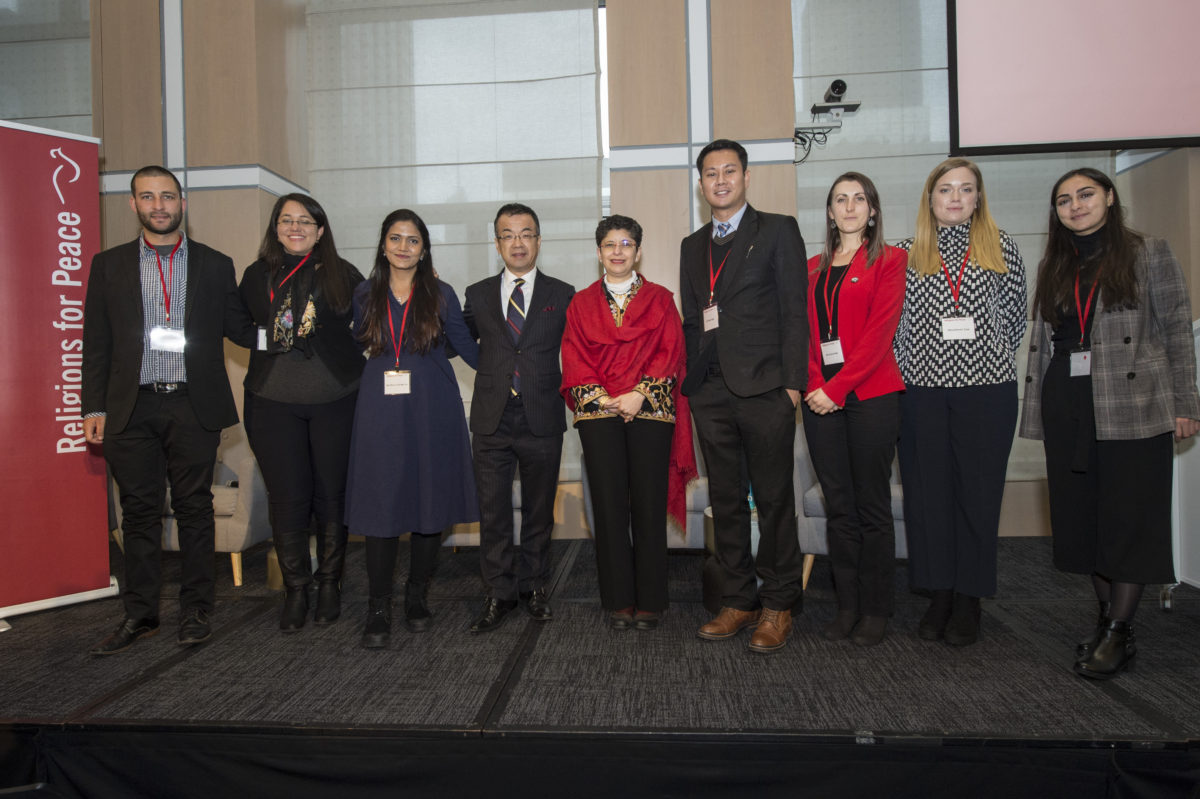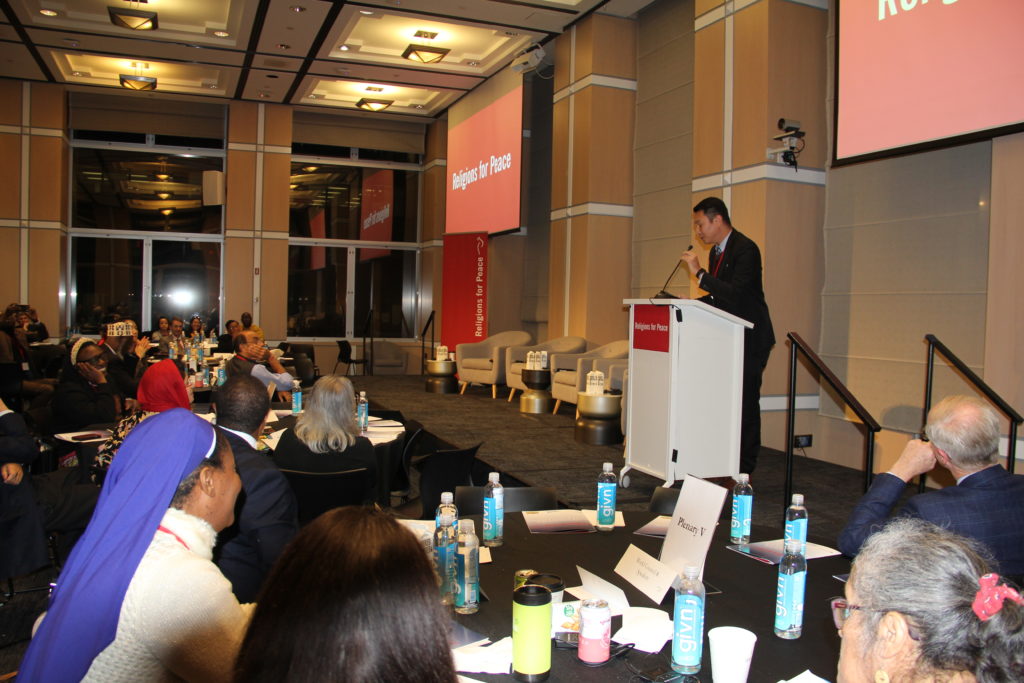(New York, USA) The Religions for Peace (RfP) International Youth Committee presented a report to the RfP family, religious leaders, UN agencies, government leaders and partners during the “Multi-Religious and Multi-Stakeholder Partnership for Peace and Development” hosted by RfP in New York City.
The report was extremely well received and clearly indicated the leadership and energy that youth are prepared to bring to RfP during the Strategic Planning process on 12 December, and for the implementation of this plan in the coming years.
Complete remarks were offered by Mr. Renz Argao, Coordinator for the International Youth Committee, who was recently elected by the entire RfP Global Interfaith Youth Network at the 10th World Assembly in August 2019.
Excellencies and eminences, Members of the World Council, International partners, dear colleagues in Religions for Peace, ladies and gentlemen, good afternoon!
Of the 200 individuals present here today, there are about 10% who are representing the youth of Religions for Peace. In the 50 years of RfP, our coalition has taken steps to mainstream the contributions of the youth in our work to advance peace and promote our shared well-being. This is evident in the flagship projects and programs of the Global Interfaith Youth Network such as the Arms Down Campaign for Shared Security and, recently, the Our Earth, Our Responsibility Campaign to protect the Earth. Youth networks from the six regional bodies and 90 national chapters of RfP have been actively involved in their own respective projects and advocacies.
Moving forward, allow me to share some of the reflections from the Youth Network. These reflections, which I would call as realizations, so as to make them more concrete, come from my discussions with my fellow youth leaders from when we were in Lindau during the 10th World Assembly and then over the period leading to this meeting and now that we are here in New York. I would summarize these realizations to 3 points: The youth is the future. The youth are agents of change. The youth are stakeholders in the mission of RfP.
First, the youth is the future. A common narrative that we hear is that the youth is the hope of the future. Let me rephrase that to the Youth is the Future. And it is our future that is at-stake, especially in connection to the discussions we had today and that we will have in the next two days. It is our future that is threatened by the many issues and challenges that our world face today. If we all do not act now, we will not have a future to look forward to. Our children and their children will not have a world to live in. Rev. Masamichi Kamiya, Senior Advisor of the Asian Conference of Religions for Peace, once said that the youth is the hope of the present. It is the youth, and the many generations to come after us, that should serve as the hope for you, our senior leaders, our parents and grandparents. Think about your children, your grandchildren, and their children. Let them be your hope and inspiration. As Ms. Laura VARGAS shared to us earlier, young people are leading the way because we feel that our lives are in danger. Give us hope too and secure the future of your children. It is our future that you should consider when making decisions that affect us.
This brings me to the next realization; The Youth are Agents of Change. While our RfP family has mainstreamed our contributions, there is still a need to broaden our involvement particularly in making decisions that can affect us. Existing power structures in many areas of society often put the youth on a lower, less important level. Older generations expect us to know what to do with our future, but most of the time we are not given the independence to make decisions for our future. We are often blamed for the current problems of the world, but we are merely recipients of the consequences of the actions of generations before us. We did not start hate speech, many of us are the ones strongly against it. Our lifestyles did not cause climate change, it is the kind of life we were brought to or raised in. We did not elect fascist regimes, yet we are the ones suffering from them. Many older people hate the attitude of young people, but think about it: The youth are the ones fighting the battles of wars that older generations started. You got us into these problems, at least give us the chance to help you solve them.
The third and last realization is that the Youth are stakeholders in the mission of Religions for Peace. We have our own needs, our own perspectives of issues, our fair share of solutions. Our use of social media allowed us to connect to our friends from different parts of the world and has allowed us to learn about issues from varied perspectives. We are “woke” – a term which now means being aware of social and racial justice. We stay woke, for when our eyes open to the realities of our present world, it is no longer acceptable to close our eyes. Therefore, consider us your important partners towards peace and development. In our simple ways, like posting on social media to raise awareness on injustices, marching for climate action, and joining our hands to fight violence and conflict, we can also be advocates for peace and our shared wellbeing.
We may be young, but we are not too young to not be involved. I have personally witnessed the energy of my fellow youth leaders and their eagerness to act. Their energy is contagious; their passion, inspiring. We are more aware; we have ideas to address issues, bringing with us learnings from the past, from you, while at the same time staying relevant to the changing landscape of our society. We have the technological knowledge and resources that enables us to act. We are connected more than ever.
To conclude, let me share with you our prayers. We pray that as we foster partnerships towards peace and development, you consider the important contributions that the youth have and in considering these contributions, allow us to offer not just our voices and our insights, but allow us to reach out our hands and help shape these common actions for our future. Allow us to roll our sleeves up and get our feet on the ground. We pray that you consider us also as your partners and not just your beneficiaries. The youth are stakeholders with valid interests and we need to recognize and accept that they are equal constituents who can and must be engaged on a level platform as another interest group. Diversity of ideas must also recognize the equally important ideas of the youth. So, as we put in Interreligious perspectives, may we also bring in intergenerational perspectives. We pray that as you lead us with your wisdom and experiences, allow us to lead you, too, with our energy, passion and fresh ideas. We pray that as we move forward, you let the youth join you in the front as we all lead the way.
Let us admit, many of the problems we face today have been passed on to us or caused by the generations past. Therefore, allow me to be candid in saying this: we youth leaders of RfP sincerely hope that the global problems that you, our senior leaders, are dealing with now will no longer be the same problems that we will deal with in the 15th or 20th World Assembly. Please, don’t let them be the same issues. For if they would be the same issues or if our world becomes far worse than it is today, then that means we failed. Some of us may no longer be around to hear or see the judgment of future generations on the actions we take today, but may we keep in our hearts that our accountability goes beyond today’s society. We are accountable to all of humanity and all of life on Earth, to those before us, and most importantly, to the generations after us.
Thank you very much and may peace be upon you all.

